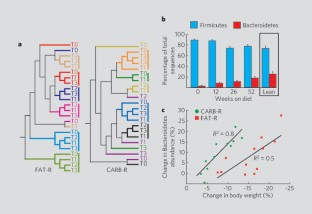Human gut microbes associated with obesity (original) (raw)
- Brief Communication
- Published: 21 December 2006
Microbial ecology
Nature volume 444, pages 1022–1023 (2006)Cite this article
- 93k Accesses
- 6458 Citations
- 520 Altmetric
- Metrics details
Abstract
Two groups of beneficial bacteria are dominant in the human gut, the Bacteroidetes and the Firmicutes. Here we show that the relative proportion of Bacteroidetes is decreased in obese people by comparison with lean people, and that this proportion increases with weight loss on two types of low-calorie diet. Our findings indicate that obesity has a microbial component, which might have potential therapeutic implications.
This is a preview of subscription content, access via your institution
Access options
Subscribe to this journal
Receive 51 print issues and online access
$199.00 per year
only $3.90 per issue
Buy this article
- Purchase on SpringerLink
- Instant access to full article PDF
Prices may be subject to local taxes which are calculated during checkout
Additional access options:
Figure 1: Correlation between body-weight loss and gut microbial ecology.

Similar content being viewed by others
References
- Gill, S. R. et al. Science 312, 1355–1359 (2006).
Article ADS CAS Google Scholar - Backhed, F. et al. Proc. Natl Acad. Sci. USA 101, 15718–15723 (2004).
Article ADS Google Scholar - Ley, R. E. et al. Proc. Natl Acad. Sci. USA 102, 11070–11075 (2005).
Article ADS CAS Google Scholar - Turnbaugh, P. J. et al. Nature 444, 1027–1031 (2006). | Article |
Article ADS Google Scholar - Rawls, J. F., Mahowald, M. A., Ley, R. E. & Gordon, J. I. Cell 127, 423–433 (2006).
Article CAS Google Scholar - Eckburg, P. B. et al. Science 308, 1635–1638 (2005).
Article ADS Google Scholar
Author information
Authors and Affiliations
- Washington University School of Medicine, St Louis, 63108, Missouri, USA
Ruth E. Ley, Peter J. Turnbaugh, Samuel Klein & Jeffrey I. Gordon
Authors
- Ruth E. Ley
You can also search for this author inPubMed Google Scholar - Peter J. Turnbaugh
You can also search for this author inPubMed Google Scholar - Samuel Klein
You can also search for this author inPubMed Google Scholar - Jeffrey I. Gordon
You can also search for this author inPubMed Google Scholar
Corresponding author
Correspondence toJeffrey I. Gordon.
Ethics declarations
Competing interests
The authors declare no competing financial interests.
Supplementary information
Rights and permissions
About this article
Cite this article
Ley, R., Turnbaugh, P., Klein, S. et al. Human gut microbes associated with obesity.Nature 444, 1022–1023 (2006). https://doi.org/10.1038/4441022a
- Received: 08 October 2006
- Accepted: 10 November 2006
- Published: 21 December 2006
- Issue Date: 21 December 2006
- DOI: https://doi.org/10.1038/4441022a
This article is cited by
Editorial Summary
Inside story
Our gut microbes do us a service by performing metabolic chores that we have not evolved to do for ourselves. In a sense their genes are part of the 'metagenome' that is Homo sapiens. That is illustrated by two related papers in this issue that present evidence for a microbial component to obesity. A study of the abundance of the two dominant groups of bacteria in the gut of obese individuals shows that increased numbers of Bacteroidetes bacteria correlate with weight loss. And a study of genetically obese mice reveals that their gut microbial community has a greater capacity for harvesting energy than that of lean littermates: the trait is transmissible by transplanting the community into germ-free mice. This work suggests that the gut microbiome associated with obesity might be a biomarker and possibly a therapeutic target.